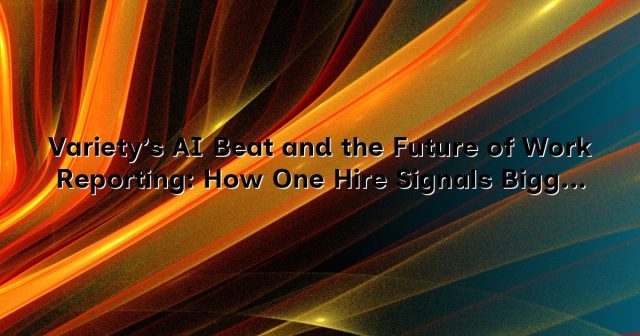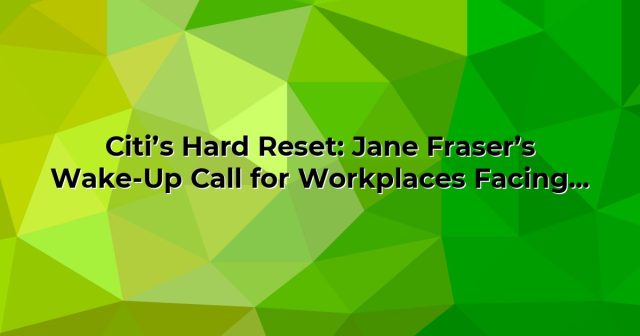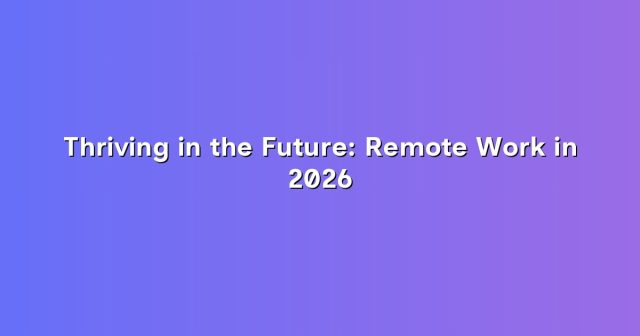Variety’s AI Beat and the Future of Work Reporting: How One Hire Signals Bigger Change
Variety’s AI Beat and the Future of Work Reporting: How One Hire Signals Bigger Change
When a legacy entertainment title moves to hire a dedicated artificial intelligence reporter, it reads less like a personnel announcement and more like a pulse check on the industry. Variety’s decision to seek an AI reporter is shorthand for a larger moment: workplaces everywhere are confronting systems that shape hiring, productivity, creative output, surveillance and culture. For the community that covers work, careers and organizations, that decision is a signal — a call to sharpen tools, expand beats and translate a rapidly technical conversation into stories that matter at the water cooler, in the HR inbox and on the production floor.
Why an AI beat matters to Work news
AI is not a niche technology tucked away in R&D labs. It has moved into the workflows, performance metrics and everyday tools that define how people do their jobs. That migration transforms the beats that cover corporate strategy, labor, benefits and office culture into fronts where algorithmic decisions play out.
Editors and newsroom leaders who add AI reporting to their roster are acknowledging what readers already know: the mechanics behind resume-screening algorithms, the real effects of automation on middle-skill jobs, the design choices baked into workplace productivity suites — these are no longer abstract policy issues. They are matters of career trajectories, worker dignity and company culture. The journalist who can translate model design, deployment choices and metrics into implications for employees becomes indispensable to a workforce trying to understand and influence the systems shaping their days.
From novelty to necessity: The new rhythms of coverage
Early AI coverage often centered on breakthroughs, product launches and buzz. The next phase of coverage must be integrated, persistent and practical. A newsroom equipped with an AI reporter can:
- Track how companies deploy AI in hiring, performance evaluation and access to pay or promotions.
- Investigate the human impact of automation across industries — not only which jobs change, but how roles are redesigned and what support systems appear (or fail to appear) for affected workers.
That kind of reporting requires different rhythms. Teams will move between rapid, practical explainers that help readers navigate a new tool and long investigations that follow the consequences of deployment decisions. It also changes the cadence of sourcing: conversations with designers and product managers sit alongside labor advocates, managers, front-line employees and public records.
New beats, old principles
The core craft of reporting doesn’t change — verification, curiosity and fairness remain central — but the inputs and outputs evolve. A reporter covering AI for the Work beat needs technical literacy: not to write code for production but to understand model behavior, limitations and testing processes well enough to ask the right questions and interpret responses. That literacy allows coverage to move beyond hype cycles and toward accountability.
At the same time, the newsroom’s editorial instincts — which stories serve readers, how to balance depth and accessibility, how to surface impacts on different kinds of workers — become more important. An AI story that dazzles with metrics but ignores the human consequences misses the point. The job is to relate technology to lived experience, economic realities and cultural shifts.
Telling the workplace story: angles that matter
Practical, high-impact story angles for Work reporters include:
- The invisible gatekeepers: How hiring algorithms shape candidate pipelines and internal mobility.
- Work redesign: When automation arrives at a company, what happens to roles, responsibilities and expectations?
- Performance and surveillance: How monitoring tools interpret behavior and what that means for evaluation, stress and privacy.
- Bias in outcomes: When models affect pay, promotion or access to opportunities, who benefits and who is left behind?
- Reskilling vs. displacement: Which employer programs lead to durable career transitions, and which are PR gestures?
- Union and governance responses: How labor organizations and policy-makers are reacting to algorithmic management.
Each of these is a newsroom beat in miniature — part technology reporting, part labor reporting, part investigation and part narrative feature. The journalist who can thread those strands creates work that matters to readers and to workplaces themselves.
Ethics, transparency and trust
As AI moves into the daily mechanics of work, trust becomes a journalistic priority. Readers will want to know not only whether a tool exists, but who is accountable for its consequences and how decisions are audited. Coverage that calls for transparency in deployment, clarity about decision-making, and accountability for outcomes pushes organizations toward better practices.
That means reporters should demand documentation of metrics, testing protocols and change logs in deployments that affect workers. It also means asking whether organizations have dispute-resolution processes when algorithmic decisions go awry. Those inquiries are central to stories that protect readers’ interests at work.
Tools, collaboration and newsroom investments
Covering AI well requires newsroom investments beyond a single hire. That can include training in data analysis and model interpretation, access to datasets for testing claims, and collaborations with colleagues in data and investigations. It also requires editorial workflows that allow for iterative reporting: small rapid pieces to help readers make immediate choices, and longer investigations that reveal deeper consequences.
Newsrooms that succeed will be those that blend editorial judgment with workflow supports: sources of data, ethical review for sensitive stories, and a commitment to explain technical material in human-centered ways. For the Work news community, this is an opportunity to broaden the definition of investigative reporting to include algorithmic accountability and to develop new beats that straddle technology and labor.
What this means for careers and newsroom culture
Variety’s move signals a labor market truth: journalists who can bridge technical knowledge and human consequence are increasingly valuable. That has implications across the career lifecycle. Early-career reporters can develop specializations that position them at the intersection of technology and labor reporting. Mid- and senior-level editors will need to create career paths that reward cross-disciplinary skills, and newsrooms will have to invent mentorship structures that help translate technical fluency into accessible storytelling.
Hiring for an AI beat also nudges newsroom culture toward cross-functional collaboration. Technology desks, data teams and Work reporters will find natural overlap. When those groups share skills and workflows — not to homogenize coverage, but to amplify impact — readers get stories that are rigorous, relevant and actionable.
The audience is already practicing the beat
Employees, managers and HR professionals are already living the AI beat. They are forming opinions, making decisions and lobbying internally based on their experiences with tools. For the Work news audience, a new kind of reporter is a translator and a watchdog: someone who renders technical claims intelligible and holds decision-makers accountable for the outcomes those tools produce.
A final note: journalism as civic infrastructure
Remember that work reporting is civic infrastructure. When reporters illuminate how algorithmic systems affect wages, promotions and workplace safety, they do more than tell compelling stories — they enable public debate and policy responses. Variety’s decision to hire an AI reporter is a reminder that as technology changes how we work, journalism must change, too: to ask the hard questions, to clarify trade-offs, and to center the people whose daily lives depend on decisions that were once invisible.
For the Work news community, that’s an invitation. Invest in teams that can translate complexity into clarity. Build beats that cross the technologic and the human. And above all, keep the focus on the people who do the work — because stories about AI at work are not about machines alone, they are about the lives and livelihoods those machines touch.




























